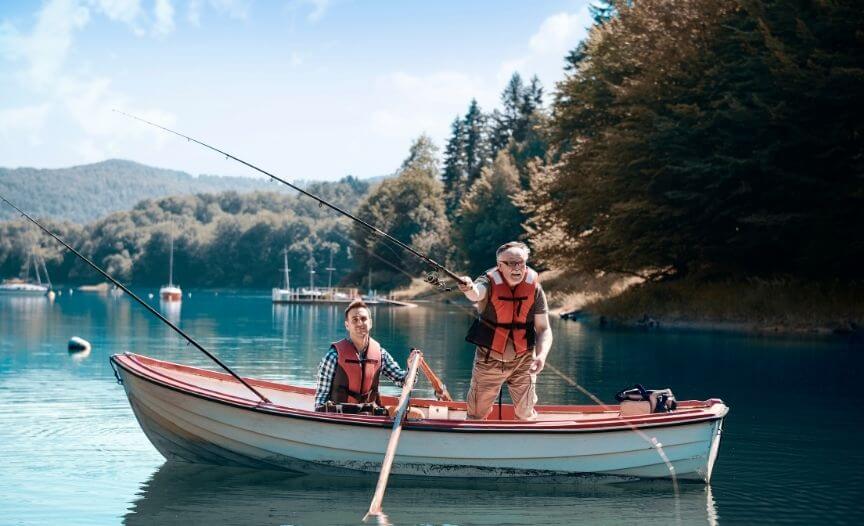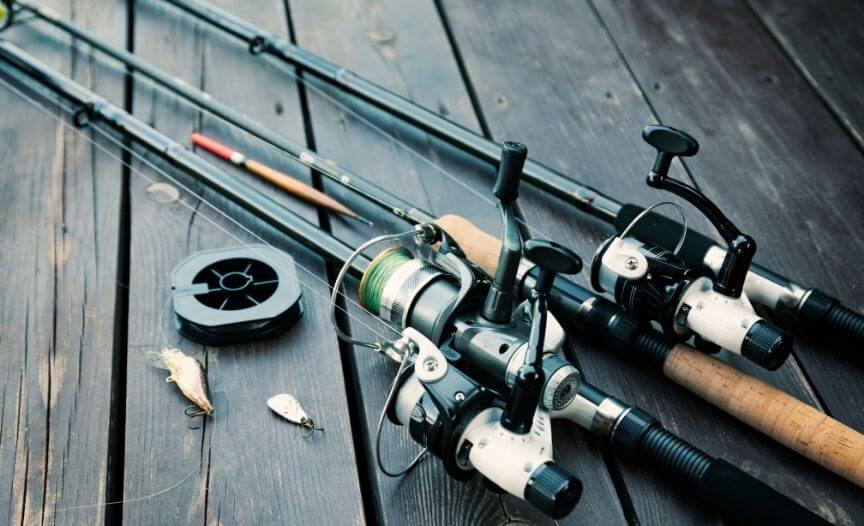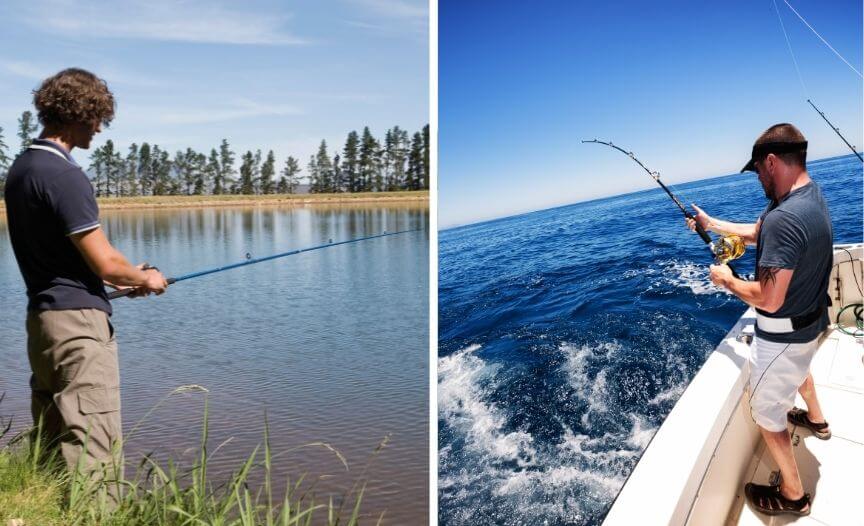There is a big difference between saltwater and freshwater fishing. Some of the significant differences between the two include the type of bait you can use and the type of fish you can catch.
Whether you settle on freshwater or saltwater fishing for your next fishing trip, we will compare those options in this article.
Types of Fish
The type of fish we catch in saltwater is different than freshwater.
Common freshwater catches
Just as there are different types of freshwater habitats for freshwater fish, there are other species of fish inhabiting those particular habitats. Trout thrive in cooler waters. Largemouth bass thrives in anything from small farm ponds to huge reservoirs, and anglers seek out them when they swim. The large rivers hide diverse fish species like catfish, striped bass, carp, and fish like smallmouth brook trout.
Freshwater ponds and lakes can be home to bluegill, muskies, northern pike, and walleye. Smallmouth bass and wood bass can be discovered in every lake, while crappies can be hunted in even the smallest wetlands.
Freshwater fish represent an extensive collection of gamefish, and each of them brings something different to the angler.
Common saltwater catches
If you’re an inshore freshwater fisherman, the sky is literally your limit. Also, saltwater anglers can fish for everything from the sea to tarpon. Anglers fishing the Northeast coast’s coastal waters can expect flounder and cod to gather in the bays and river mouths. Striped bass and bluefish tend to respond to casting lures from surf casters.
Anglers enjoy red drum (redfish), tarpon, and bonefish as they explore the shallow domes of bays. These fish may be caught using conventional equipment, fly-fishing tackle, or even firearms. Snook resemble saltwater versions of the common largemouth bass, and sharks often patrol the waters of various oceans.
The unpredictability of sea life contributes to its appeal as a fishing sport.

Fishing Styles
The styles and techniques vary according to the type of water you’re fishing. Have careful reading of each concept as there is overlap between the subcategories of freshwater and saltwater.
Popular Freshwater Fishing Styles
There are many different freshwater fishing styles, and each one can produce a different type of catch. Here is the most popular fishing style in freshwater.
Boat Fishing
When it comes to fishing, many anglers believe that the best way to cover as much water as possible is to use a boat. And they would be right – boats provide anglers with the ability to move quickly and easily from one spot to another, maximizing their chances of catching fish.
In addition, fishing from a boat allows anglers to reach inaccessible areas, such as deep water or dense cover. This can be especially important when targeting larger fish or hard-to-reach fish.
Dock Fishing
Dock fishing is a great way to catch fish in your local waterways. This type of fishing is done by using a dock or pier as your bait station and casting your line into the water. You will need to find a place with plenty of fish, and you can easily access the water.
Spearing
Spearing fishing is a technique used to catch fish by using a spear. The spear is held in one hand, and the other hand is used to control the movement of the spear. This technique is used when fishing in open water as it allows for more accurate catches.
Noodling
Noodling fishing is a type of fishing where the angler uses a long pole with a wide, round bait to search for fish in areas where they are most likely to be found. Noodlers can use several different baits to catch various fish, from worms to cheeseburgers.
Fly Fishing
Fly fishing is a great way to spend a day. You can use it to catch trout, salmon, or other fish. You will need a fly rod and a fly line. The fly rod is used to carry the hook through the air. You will need to know how to cast the fly. The fly line is used to hold the fly in place.
Ice Fishing
Ice fishing is a great way to spend a day in the wintertime. You can go out on the ice and catch some nice fish. Ice fishing can be done through an opening in a frozen lake and various equipment, but the most common is a fishing rod and reel. In addition to catching fish, ice fishing can also provide entertainment for people spending time outdoors.
Popular Saltwater Fishing Styles
Saltwater fishing is a popular pastime enjoyed by people of all ages and backgrounds. There are many different fishing styles to choose from, and each has its unique rewards. Some fishing areas are better suited for a particular technique than others, but there is always something to be found on the water.
Deep-Sea Fishing
Fishing is a popular hobby and a way to make a living in many parts of the world. There are different types of fishing, including deep-sea fishing. Deep-sea fishing is done in the ocean, and it is a type of sport fishing. Anglers use heavy tackles and large baits to catch fish that live in the deeper parts of the sea. Some common fish caught in this way include tuna, marlin, swordfish, and sharks.
Surf Fishing
Surf fishing is done by standing on the shoreline and casting your line out into the surf. You can use a variety of bait, including worms, shrimp, or artificial lures. Surf fishing can be productive any time of year, but it is best during the spring and fall when there are schools of fish near the shore.
Pier Fishing
Pier fishing is an exciting, challenging sport that all ages can enjoy. The pier can provide a great location to fish for a variety of commercial and sports fish, including bass, bluefish, stripers, and catfish. Pier fishing requires an accurate weapon and good technique to land the desirable catches. You need to know several things before you go pier fishing, but it can be an enjoyable and rewarding experience once you do.

Fishing Gear
Different fishing gears are necessary for saltwater and freshwater fishing. While there are a few similarities, the gear needed for each type of fishing is different.
The marine environment can be very challenging. Saltwater fishing equipment may have special casings for the most crucial parts, protecting them from seawater damage. Freshwater equipment, meanwhile, may use standard materials such as steel because the risk of corrosion is much lower, and components do not have to be sealed off.
Rods
Saltwater and freshwater fishing rods have different features that make them better suited for certain types of fishing. A saltwater rod is typically stiffer and lighter, making it better for casting long distances. On the other hand, a freshwater rod is more flexible and is better for close-to-shore fishing. There are also different types of saltwater and freshwater rods designed for different types of fish.
Reels
Saltwater and freshwater fishing reels can be used interchangeably, but there are a few things to consider when choosing one for your needs. You’ll want a reel with a heavy-duty drag system and an extra-large spool for saltwater fishing. Look for a reel with a light drag and a small spool for freshwater fishing.
The type of line you use will also affect your choice of a reel.
Lures
Many different fishing lures are on the market, but which one is right for you depends on your fishing style and location. For saltwater fishing, many anglers prefer spinnerbaits or crankbaits. These lures have a variety of blades that move around and create noise, attracting fish close to the boat. Other popular lures include plastic worms, soft plastics, and live bait.
Freshwater fishing lures come in many shapes and sizes. Some are designed specifically for catching trout, while others are intended for panfishing (catching a wide variety of fish). Popular lures include jigs, minnows, grubs, and plugs.
Related Questions
Which one is better for beginners?
If you’re new to fishing, freshwater fishing might be the best option. You won’t need any special fishing gear, and you can learn how to cast and hook up to smaller fish species like perch, crappie, and bass.
Newbies can begin learning to fish in controlled environments, the technique of fishing, and venture into small food varieties till they have the confidence to tackle larger kinds.
What sets saltwater fishing gear apart from freshwater gear?
Saltwater fishing gear differs from freshwater fishing gear in a few key ways. For one, saltwater gear is designed to resist corrosion and hold its strength over time. Saltwater lines are also heavier than their freshwater counterparts, making them more stable in the water. Lastly, saltwater fishing rods are typically designed with a more extended handle to provide more leverage when casting.
What should you consider before embarking on a freshwater fishing trip?
Freshwater fishing trips can be a lot of fun, but you should consider a few things before deciding if this is a suitable activity for you. First, make sure you have the proper gear. You’ll need a good fishing rod, reel, line, and bait. Second, make sure to check the tide and day cycles and water temperature. If the water is too cold or murky, your trip will be ruined.
Temperature also plays a crucial role. Some freshwater species will be more likely to emerge when they can thrive at the ideal temperatures. With optimal water temperatures, your catch rates will increase significantly.
What are the important factors to consider when fishing in saltwater?
When you seek deep sea fishing, having access to information about the water depth, salinity, and temperature can increase your chances of landing a fish. To effectively fish for saltwater, you’ll need to know the fish species adapted for various sea depths and water temperatures. Species that are adapted for multiple sea depths and water temperatures. To determine the depth of a body of water, you can use a depth finder. This device measures the pressure of the water below the surface and displays it as feet or meters. This is especially useful in finding a good fishing spot.

